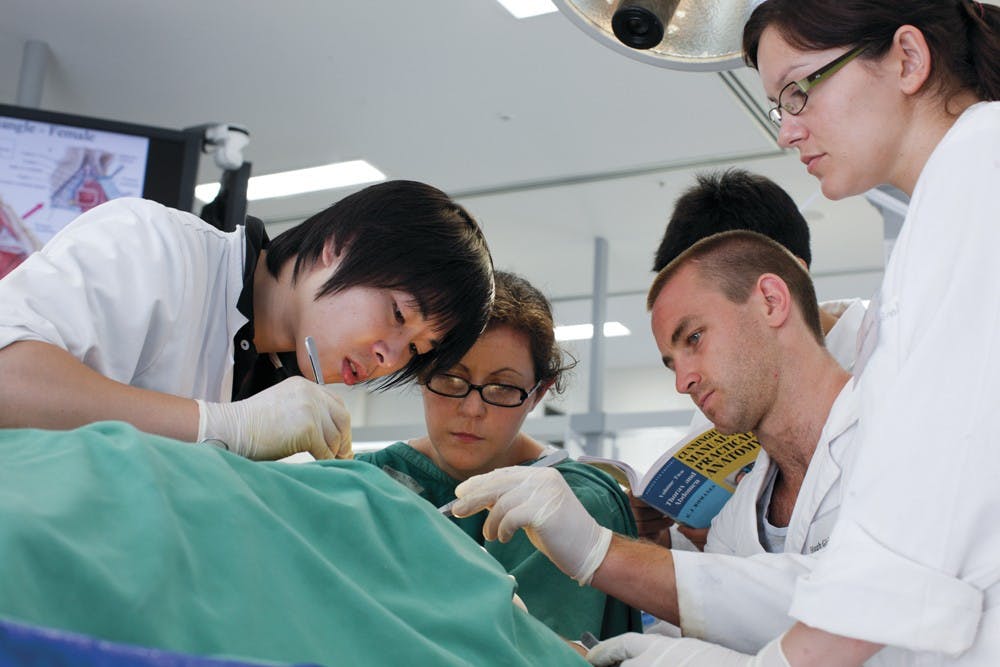In every University graduating class, there are hundreds of students who plan to pursue a career in medicine. Medical schools have tough enrollment requirements such as organic chemistry, molecular biology, and physics to start, on top of a wide range of electives and extracurriculars. The work of students who successfully complete all of the requirements should be commended, given the difficulty of these classes on top of the time commitment required for clinical experience and studying for the MCAT. These classes and experiences are integral to a future career as a doctor — biochemistry, for example, provides a foundation for learning how certain drugs affect metabolism and cell function, which is undoubtedly necessary for doctors. Yet as comprehensive as pre-medical requirements are in some areas, they are lacking in others that are critical to an effective career in medicine.
The past two summers, I have worked at medicine-related internships, without actually spending time in a hospital or lab. In both of these positions, one thing became clear: There is a lot more to medicine than simply the science of the human body. Doctors face many other problems, ranging from health care inequality due to geographic concerns to determining when it is appropriate to prescribe pain medication in light of the opioid epidemic. The current medical school requirements allow one to understand the science behind these issues, but they do not provide a comprehensive understanding of how our current legal and health care systems constrain the science. Though many universities, ours included, offer classes that deal with these subjects, none of these courses are required to attend medical school. Similarly, achieving a desirable score on the MCAT does not require knowledge of public health issues. Many pre-med students complete their undergraduate experience without considering the challenges a doctor might face outside of the exam or operating rooms.
Global and public health classes should be required for medical school, as opposed to just an afterthought if they fit in one’s schedule (which, with the guaranteed busy schedule of a pre-med student, they probably don’t). These courses allow students to understand the logistics and struggles that their patients may face on a daily basis. For example, the New York Times recently reported on the case of a woman traveling over 100 miles to the nearest hospital to give birth. This was the closest health care facility with an obstetrics/gynecology department, as the hospital in her own small town had recently closed down due to lack of funding. The trek that the woman was forced to make, without an alternative birthing plan, put both her and her baby’s well-being at risk. If a doctor is aware of the complications that may arise from a woman’s waiting hours with contractions before receiving any medical attention, then the doctor may choose to change the birthing procedure to ensure convenience and safety for the future, perhaps putting patients on bed rest in the hospital close to due dates. Similarly, if given comprehensive knowledge of how insurance policies work, doctors would be able to aid women seeking coverage of proper reproductive health care in today’s tumultuous political climate. These changes deal with our own country, but imagine the difference doctors could make in international programs, such as Doctors Without Borders, if they received education in foreign government’s health care systems as undergrads.
One might argue that more pre-medical requirements will deter students from taking other classes during their undergraduate careers, such as electives and other courses they may be more interested in. However, if students cannot see the value of understanding the public health systems guiding medicine, then medical school may not be the right choice for them. The primary motivating factor behind pursuing a career in medicine should be helping patients. Knowledge of biochemistry or physics is invaluable for directly helping patients alleviate their symptoms, but the ability to help patients navigate the complexity of their health care systems once they leave the examination room is equally important.
Morgan Lucey is a rising senior studying neuroscience from Scottsdale, Ariz. She can be reached at mslucey@princeton.edu.








